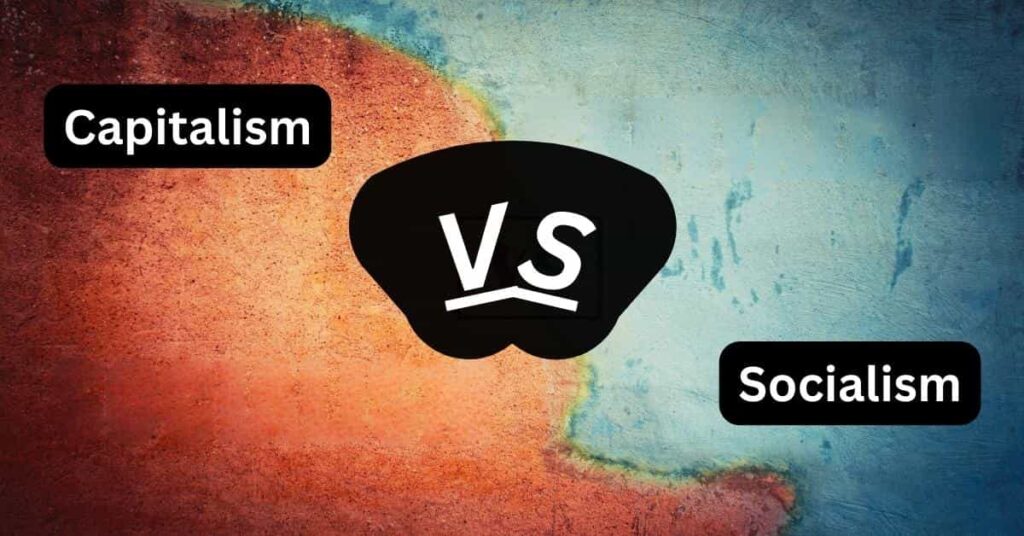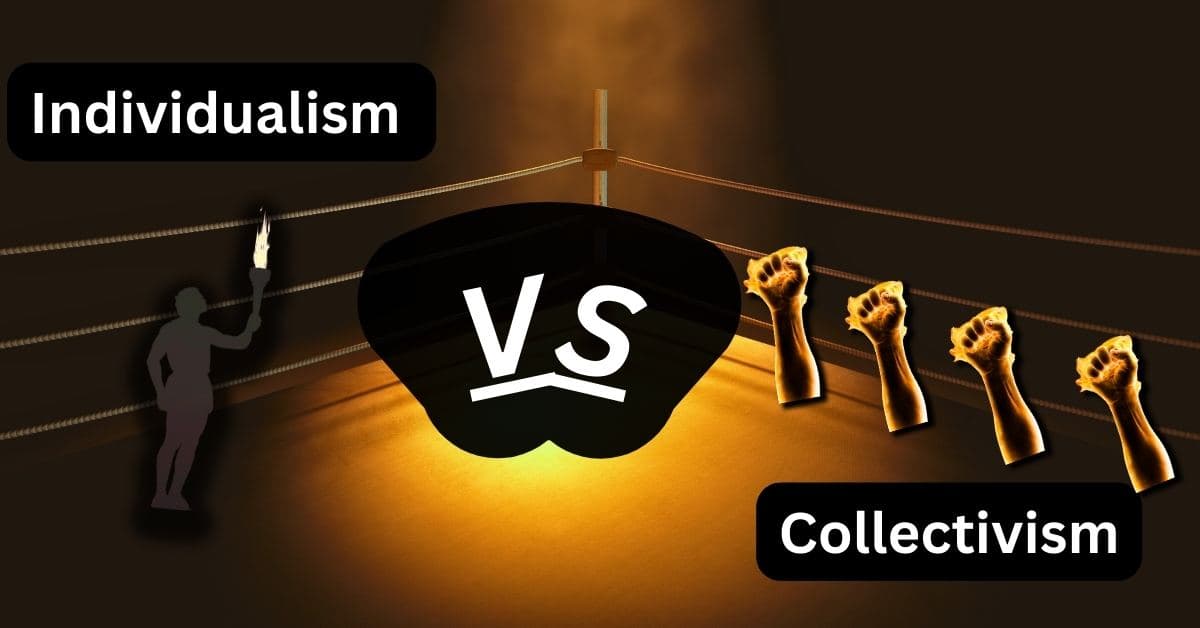In a boxing ring, individualism and collectivism would fight until one gained dominance. It would be a mess! On the political spectrum, they’re incompatible.
This difference led to debates among philosophers, psychologists, and politicians.
Individualism is a system that makes the self-supreme. It emphasizes capitalist principles of economic freedom and achievement. Collectivism asserts group dynamics over individual desires and aspirations. Associated collectivist structures include socialism and communism.
Preparing for this post, I read numerous scholarly articles and books, listened to college lectures, and thought back about my interactions with different cultures. You will find a more political explanation. Within my approach, I will talk about cultural aspects and values too.
Here are 2 quotes below representing the fundamental differences between the 2 ideologies:
“If liberty means anything at all, it means the right to tell people things they do not want to hear.”
George Orwell
Individualist Perspective
“More socialism means more democracy, openness, and collectivism in everyday life.”
Mikhail Gorbachev
Collectivist Perspective
General Ideas of Individualism vs Collectivism
Let’s compare the quotes.
George Orwell is a renowned author known for his staunch opposition to collectivism. He advocates for the pursuit of truth to express unwanted opinions.
Orwell believes that seeking honesty represents a more open society. Transparency helps keep values of self-expression and personal choice paramount. Freedom of speech happens only in cultures where truth reigns.
Conversely, Mikhail Gorbachev became the last leader of the USSR. We know it today as Russia. He believes promoting collectivist ideals like socialism and central planning will create a more inclusive society. Gorbachev focuses on the societal “common good”.
As a result, USSR citizens must suppress their dreams and desires. His approach embodies key collectivist values of social cohesion and obedience to authority.
Both these quotes emphasize the underlying differences. Individualism represents individual rights, and collectivism portrays societal well-being.
Overview of Individualism
With individualism, the primary focus is liberty and freedom. Society consists of individuals- not groups.
A political and social system based on the “I”. Values, habits, and personal interests are independent of collective action and thought. -Individualism Definition
You’re the sole determiner of your choices. While government exists, it should be a background element to your life.
It’s yourself and the nuclear family vs others.
Yes, your closest allegiance will be to your family. I’d imagine you spend most of your time with them so that makes sense, right?
Indeed, arguments are a part of life whether with your family or friends. As Orwell stated above, conflict promotes individuality and creativity. That’s only a hint of the values individualism promotes.
Overview of Collectivism
Collectivism focuses on coercion and the equality of everyone. Coercion implies the use of force to accomplish major goals. You’re not doing actions of your free will.
A political and social system stressing the “We”. People see themselves as part of a communal body. They are bound by duty and social norms to self-sacrifice for the group’s “common good”. – Collectivist Definition
In collectivist cultures, you must seek group consensus to make decisions. Maintaining group harmony is essential to establishing ingroups vs outgroups.
Ingroups share a “common fate” and mission. History is extremely important. They want to trace their lineage back to their descendants and ancestors.
Examples include:
- families
- tribes
- castes
- economic status
Outgroups are hostile to your own. They represent different values and conflict with your group’s interests.
If ingroups see another group as unclear, they label it as an outgroup.
A common example of ingroups vs outgroups is Democrats vs Republicans. Each political party has different goals and aspirations. Their methods for societal well-being vary.
Gangs are another vivid illustration of group dynamics. They have intense rivalries leading to the violence you see in the news.
Furthermore, collectivist equality differs from an individualist’s version. Individualists want people to be equal before the law.
Collectivist ideologies embody 3 these principles:
1. People should receive the same portions
Everyone should have the same house, car, income, and status.
2. Same treatment
Everyone should receive the same employment opportunities, education, and healthcare benefits as human rights. Recent collectivist trends emphasize internet access as a fundamental right.
3. Motivated by a sense of injustice
They derive their movements and policies from perceived wrongs.
Individualism does have valuable core ideas to understand. LEARN MORE with individualism’s essential principles.
Culture-The Start of Difference:
Individualism- The Individual
At the core of individualistic culture, upbringing, and family influence your future.
Much like you, my family is important. Family serves as a fundamental social support system.
Parents watch their children blossom into self-sufficient adults. Often called “leaving the nest”, children start their careers and seek job opportunities.
Adult children may seek parental advice when tough situations arise. However, don’t ask for help until you attempt to solve the issue independently first. Experience is critical to fostering self-reliance.
For example, what would you do the first time you have to negotiate to buy a car or to vote for your political candidate? You’ll rely on your intuition initially. After all, you’re an adult.
In relationships, individuals expect equal treatment. Yes, each person gives and takes 50%. This expectation extends to Western marriages and friendships.
Individualistic culture allows for family relationships. And they’re a critical part of daily life. Yet, those relationships also allow you to achieve your happiness and obtain your personal goals.
Collectivism-The Group
To understand how a collectivist culture works, families are like an interwoven basket. Each different part and strand are interdependent for structural integrity. If one strand breaks, the basket’s contents fall apart much like family dynamics.
According to leading scholar Harry Triandis, parents teach children obedience and sacrifice as vital.
Let’s say the family owns a restaurant. Out of obligation, they will work serving food or washing dishes. Children will forgo educational opportunities abroad. They don’t want to disgrace the family.
Remember, collectivism represents group dynamics. You’re part of a whole instead of an individual within the organization.
A group member must ask themselves this one question:
“How will my actions be perceived if presented to other groups?”
Moreover, collectivist communication styles differ from individualist methods. People hesitate to give direct opinions to superiors.
While traveling in East Asia, I noticed this phenomenon. I asked a simple question, “How was your weekend?”.
I expected detailed answers but received “just good”. Many of my Eastern colleagues adhered to collective ideals of humility. They didn’t want to appear boastful.
Another interesting aspect is that women often hold lower status. They’re a top-down power structure with men bearing the most authority. You’ll find examples of this in Indian caste systems.
Overall, collectivist culture puts the family first. Children don’t always go after their dreams. Communication is indirect and ambiguous.
Values and Attitudes
| Individualism Values | Collectivist Values |
|---|---|
| Liberty, Freedom | Equality, Security |
| Independence | Interdependence |
| Self-reliance | Obedience |
| Creativity | Conformity |
| Being unique | Group cohesion |
| Happiness | Harmony |
| Intellectual autonomy | Social order |
| Assertiveness | Virtuous actions |
| Strong sense of self-worth | Strong sense of self-worth |

Economics-The Systems of Money and Commerce
Individualist Capitalism
Capitalism is the associated economic system with individualism. It emphasizes self-interest made popular by Adam Smith in The Wealth of Nations.
In capitalism, you must strive for excellence beyond being average. Combined attitudes of high self-esteem, personal freedom, and autonomy help you reach your goals faster.
Gaining wealth in free enterprise requires tremendous effort. Naturally, income gaps will arise fostering an adversarial relationship between the rich and the poor.
Scholars- like Triandis- asserted higher income individuals favor this system. Wouldn’t you promote approaches that help you succeed? It is in your best self-interest.
In general, the poor aren’t seen as self-reliant within this structure. Capitalists prefer low taxes to boost business and consumer spending. As a result, true individualist societies have lower taxes than countries with big welfare states.
Furthermore, here are 3 important factors representing a free-market system.
1. Competition
A healthy dose of rivalry and competition motivates capitalists to strive for excellence. Consumers have abundant choices in the products, goods, and services they want to buy. They choose items based on personal tastes.
No one threatens them to purchase the more expensive bottle of wine. Company marketing influences a shopper’s decision. But when they pull out their credit card, the exchange is voluntary between producer and consumer.
To ensure efficient competition, a liberal justice system is essential for fair competition. A strong legal system keeps monopolies from forming.
Walking into a grocery store is the best example of competition. You have your name-brand cereal on the lower shelf. However, if you reach higher, you’ll see the generic for a slightly cheaper price.
Think of competition as the process to increase variety and choice on your local shelves.
2. Price
Price determines the demand for products. It tells what is and isn’t selling. The typical medium of exchange in an individualist society is money for specific goods and information.
Gas prices are an easy metric to determine price. You see them every day going from place to place. Go look and compare gas prices today and then tomorrow. Let me know what you find.
3. Innovation
Innovation and entrepreneurship are 2 words individualists know well. For businesses to survive, they must invent and improve.
100 years ago, no one thought Sears would become invisible to the modern consumer. They’re only a fraction of the powerhouse they used to be. Instead of Amazon, people ordered their goods from the Sears-Roebuck catalog.
Without innovation, society’s improvement and quality of life wouldn’t be what you see today. Technology and hard work brought hundreds of millions out of poverty.
Economic Individualism Articles:
- Adam Smith is the Father of Capitalism. LEARN MORE as I describe his basic philosophy in simple terms.
- While individualism and capitalism are related systems, they have separate aspects. LEARN MORE as I describe fundamentals differences in the 2 systems.
Collectivist Socialism
Collectivist economic systems involve central planning and more government control. Two famous words linked are socialism and communism. In politics, these 2 terms bring great amounts of debate and vigor.
Thus, central planning involves a government committee in cushy chairs who makes pricing decisions from afar. The free market doesn’t control what you pay for gas. A government bureaucrat decides for you. You’ll often see price controls on certain items such as rent, commodity goods, or medical care.
Individualists criticize central planning as inefficient. There is no way to project thousands of interactions and try to predict the future. In other words, they view “big” government as your enemy, not your friend.
For instance, Stalin nationalized many farms during the mid-1920s. He eliminated competition among rivals. Many starved due to this economic incompetence.
Contemporary discussion doesn’t focus on past socialists like Stalin. They concentrate on countries like Sweden or Norway- known as democratic socialist havens. Modern collective activists believe Scandinavian countries to be “true” socialism. Historical examples like Stalin don’t reflect accurate portrayals of modern collective doctrine.
Here are some policies modern socialists claim to support:
- government healthcare
- welfare benefits for all
- free college and universities
These government programs aren’t cheap and come with hefty tax burdens. According to taxfoundation.org, Sweden has a top personal income tax rate of 52.2.%.
The overall belief of many collectivist socialists is that they don’t want to be “wage slaves”. Capitalism gives all the power to corporate bosses and thugs. They want to abolish this corporate hierarchical structure through worker co-ops.
In other words, they want the employees to control companies through nationalization.
Collectivist economic systems have more government control and higher taxes. Socialism focuses on those 2 factors to make it work.
Karl Marx- the Father of Socialism studied Adam Smith and his ideas. LEARN MORE about what Marx wanted to do society and his hatred for individualism.

Politics- The Ultimate Showdown
Individualist’s Liberty and Individual Rights
In individualism, the people control the government, not a single dictator. Citizens limit an authority’s power. Many individualist political systems involve constitutions protecting individual rights and civil liberties.
In the U.S., the Bill of Rights keeps power at bay and helps reduce the state’s overreach. An aristocratic class demanding absolute conformity and obedience doesn’t exist. The U.S. Constitution bans titles of nobility.
Individual rights aren’t mere suggestions. Government must respect them. No matter what emergency exists, activists will challenge government infringement. This commitment relates to individualist qualities of liberty and independence.
Here are examples of individualist policies stressing liberty and personal freedoms:
- uphold private property ownership
In Marx’s Communist Manifesto, a collectivist dream would abolish private property. The boxing ring becomes a real analogy when property rights aren’t respected.
Having land allows for personal autonomy away from government interference.
- shrink government
Less bureaucracy is better for the individual. Government exists for fundamental protections such as defense and only necessary regulations. Outside of those basic functions, individualists want any unnecessary government organization eliminated.
- respect privacy
Individualists want personal space respected. Not only do they like privacy in the day-to-day, but they also demand it from government spying.
In the political realm, citizens see government surveillance as a negative. Organizations such as the National Security Agency (NSA) misrepresent their name. The security doesn’t represent “security” for U.S. citizens. It symbolizes spying and control.
Also, the Patriot Act (2001) enacted after the 9/11 terrorist attacks allowed breaches of U.S. citizen privacy. Actual U.S. Patriots and individualists wouldn’t relinquish liberty for the perceived security. Recently formed government agencies used their new police powers to wiretap phone conversations.
This is a hint of all the liberties available in an individualist society.
The U.S. Constitution is over 250 years old representing an individualist perspective. LEARN MORE about its pros and cons.
Collectivist Duty for the Common Good
Returning to our boxing analogy, it comes to real life in politics. Individualism and collectivism represent opposing political systems.
Collectivist systems are a result of the family structure we discussed earlier. I emphasized the value of obedience for a reason. They learn it at a young age.
The collective aspirations are superior to individual rights. You’ll hear leaders utter terms such as:
- “common good”
- “general welfare”
- “general interest”
All these phrases mean sacrificing your interests. Your obedience and allegiance make collective political systems work.
Again, you must be part of the ingroup to live “the good life” in top-down structures. Close friends, family, and personal favors are ways of life.
Common political systems associated with collectivism are:
- communism
- fascism
Governments of this nature don’t respect your privacy. They don’t consider it important. You’re more likely to accept CCTV and government surveillance.
In short, someone somewhere watches your every move.
Conversely, individualists value privacy and fight against intrusions on individual rights.
Overall policies accepted in collectivist governments include:
- reparations
- slavery
- affirmative action
- segregation
- weaker self-defense laws
i.e. gun control laws - redistribution of wealth
- social justice
- welfare for all

Out of the list of policies mentioned above, social justice and wealth redistribution are the most prominent.
Collectivists view social justice as altruistic and compassionate. Through progressive taxation and central planning, they achieve societal good through government coercion. The terms I mentioned about “for the common good” rise to prominence here.
They attempt to end inequality, poverty, and general unfairness. Giving citizens a social safety net is their aim. Collectivists blame the inefficient economic capitalist system for societal misery.
Yet, individualist counterpoints include no social safety net is foolproof. There is still poverty in a collective system. Citizens’ individual choices and liberty deteriorate due to these awful policies.
The collectivist political structure is one of individual subjugation. Some like looking up to the government due to their absolute obedience to authority. Social justice and undoing the wrongs of individualism are their primary goals.

Altruism and Morality
Individualism- Voluntary Choice
As a quick reminder, altruism is helping the needy and doing actions for others’ well-being.
Individualist culture emphasizes your money and time are yours. Helping others- while admirable- should be a voluntary action. No one should force you to hand over vast amounts of your hard-earned income under threat from a gun’s barrel.
The words for the “common good” shouldn’t guilt you or sway you from your final decisions.
Remember, you have independence and autonomy. Your morality is either from your religious institutions or personal experience with the world.
Altruism Individualist Articles:
- A prominent advocate opposing altruism is Ayn Rand. LEARN MORE about her thoughts about self-sacrifice as I describe in my post.
- How does altruism compare to individualism? LEARN MORE as I go deeper into types of altruism.
Collectivism-Must Participate
Altruism is a moral obligation in a collectivist society. Duty guides groups focusing on social cohesion and solidarity. An active sense of belonging makes factions function better.
A timeless sacrificial story occurred in 2011. An accident occurred at a nuclear power facility spewing harmful radiation into the surrounding atmosphere. Japanese elders volunteered to replace younger workers to clean up nuclear contamination.
They saw it as their sense of duty to preserve future generations. A 72-year-old grandmother said:
“My generation built these nuclear plants. So, we must take responsibility for them. We can’t dump this on the next generation…” ~ Kazuko Sasaki
National Public Radio News Story
That level of sacrifice is rare in individualist societies. Military service is the only other organization displaying similar levels of moral obligation.
Furthermore, Triandis emphasizes lying is an acceptable form of morality. Individuals must again save face for the group’s benefit.
In an individualist culture, lying is unacceptable and offensive. Many employers will fire you for not telling the truth. Put simply, individualists see deception as inconsistent and hypocritical.
Collectivist altruism is mandatory, and no personal choice is available.
Countries of Each System
| Individualist Countries | Collectivist Countries |
| United States | Singapore |
| Australia | Taiwan |
| New Zealand | Japan |
| England | South Korea |
| Canada | China |
Conclusion
Individualism versus collectivism are overarching concepts describing more than culture. They also emphasize different political systems most don’t consider.
Collectivism is the term covering all aspects of socialism, communism, etc. Individualism correlates to capitalism and personal choice.
I hope you now understand the basic differences between the two when politicians reference them. And if you don’t think they do, watch international news. You’ll see. Don’t hesitate to ask in the comments below if you don’t locate examples.
Most of my experiences are from an individualist perspective since my upbringing is American. I would love to hear your views too. Libertyembers.com is a place dedicated to the free exchange of ideas.
Furthermore, individualism is more of a Western doctrine while collectivism leads many Asian countries’ politics. I gave an overview of the family structure, values, economics, and politics of each one. Vast differences exist with how the basic structure starts at birth.
Neither ideology will disappear and will continue to battle for generations to come.
Think about all the aspects of these 2 terms. Are they too controversial for you? Did I misrepresent them?
J. Liberty
References:
Dilorenzo, T. (2016). The Problem with Socialism. Washington D.C.: Regnery Publishing.
Hayek, F. A. (1944). The Road to Serfdom. Chicago: The University of Chicago Press.
Kemmelmeier, M., Burnstein, E., Krumov, K., Genkova, P., Kanagawa, C., Hirshberg, M. S., … & Noels, K. A. (2003). Individualism, Collectivism, and Authoritarianism in Seven Societies. Journal of Cross-Cultural Psychology, 34(3), 304-322.
Realo, A., Allik, J., & Vadi, M. (1997). The Hierarchical Structure of Collectivism. Journal of Research in Personality, 31(1), 93-116.
Socialism, U. (2019). Richard D. Wolff. New York: Democracy at Work.
Sunkara, B. (2019). The Socialist Manifesto: The Case of Radical Politics in an Era of Extreme Inequality . New York: Basic Books.
Triandis, H. C. (1995). Individualism & Collectivism. Boulder, Colorado: Westview Press.
Photo Credits
Photo Credits:
© allanswart via canva.com
© bulat silvia via canva.com
© wildpixel via canva.com
© doidam10 via canva.com
© RyanJLane via canva.com
Photo Credits
Photo Credits:
© tzahiV via canva.com




Leave a Comment